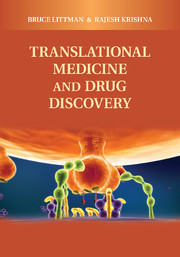Book contents
- Frontmatter
- Contents
- Contributors
- Preface
- Translational Medicine and Drug Discovery
- SECTION I TRANSLATIONAL MEDICINE: HISTORY, PRINCIPLES, AND APPLICATION IN DRUG DEVELOPMENT
- SECTION II BIOMARKERS AND PUBLIC–PRIVATE PARTNERSHIPS
- SECTION III FUTURE DIRECTIONS
- 13 IMPROVING THE QUALITY AND PRODUCTIVITY OF PHARMACOMETRIC MODELING AND SIMULATION ACTIVITIES: THE FOUNDATION FOR MODEL-BASED DRUG DEVELOPMENT
- 14 EMBRACING CHANGE: A PHARMACEUTICAL INDUSTRY GUIDE TO THE 21ST CENTURY
- Index
- References
14 - EMBRACING CHANGE: A PHARMACEUTICAL INDUSTRY GUIDE TO THE 21ST CENTURY
Published online by Cambridge University Press: 04 April 2011
- Frontmatter
- Contents
- Contributors
- Preface
- Translational Medicine and Drug Discovery
- SECTION I TRANSLATIONAL MEDICINE: HISTORY, PRINCIPLES, AND APPLICATION IN DRUG DEVELOPMENT
- SECTION II BIOMARKERS AND PUBLIC–PRIVATE PARTNERSHIPS
- SECTION III FUTURE DIRECTIONS
- 13 IMPROVING THE QUALITY AND PRODUCTIVITY OF PHARMACOMETRIC MODELING AND SIMULATION ACTIVITIES: THE FOUNDATION FOR MODEL-BASED DRUG DEVELOPMENT
- 14 EMBRACING CHANGE: A PHARMACEUTICAL INDUSTRY GUIDE TO THE 21ST CENTURY
- Index
- References
Summary
Introduction
The art of progress is to preserve order amid change and to preserve change amid order.
– Alfred North Whitehead, 1861–1947With its focus on applying the latest in medical science to deliver products to address unmet medical need, change in the modern pharmaceutical industry is fueled by the need to drive innovation in search of the next therapeutic product. Historically, pharmaceutical companies have themselves led the way in medical research by using knowledge generated through internal basic research programs or licensed from academic institutions to develop products that would in turn fuel the next generation of drugs. This leadership position was solidified by the substantial capital and infrastructure requirements of the drug development process that created significant barriers to entry for others. Academic institutions and small companies generally lacked the expertise, infrastructure, and financial resources to engage in drug discovery and development. As a result, these groups had few options for advancing or realizing the value of their own scientific breakthroughs beyond licensing to a company that had the capabilities to transform scientific discoveries into therapeutic products. Consequently, the pharmaceutical industry was the primary innovator of biomedical science for most of the second half of the 20th century.
The advent of molecular biology, the Bayh–Dole act, and increasing recognition by entrepreneurs of the potential upside of innovative drugs spawned the biotechnology revolution.
- Type
- Chapter
- Information
- Translational Medicine and Drug Discovery , pp. 328 - 344Publisher: Cambridge University PressPrint publication year: 2011
References
- 1
- Cited by



